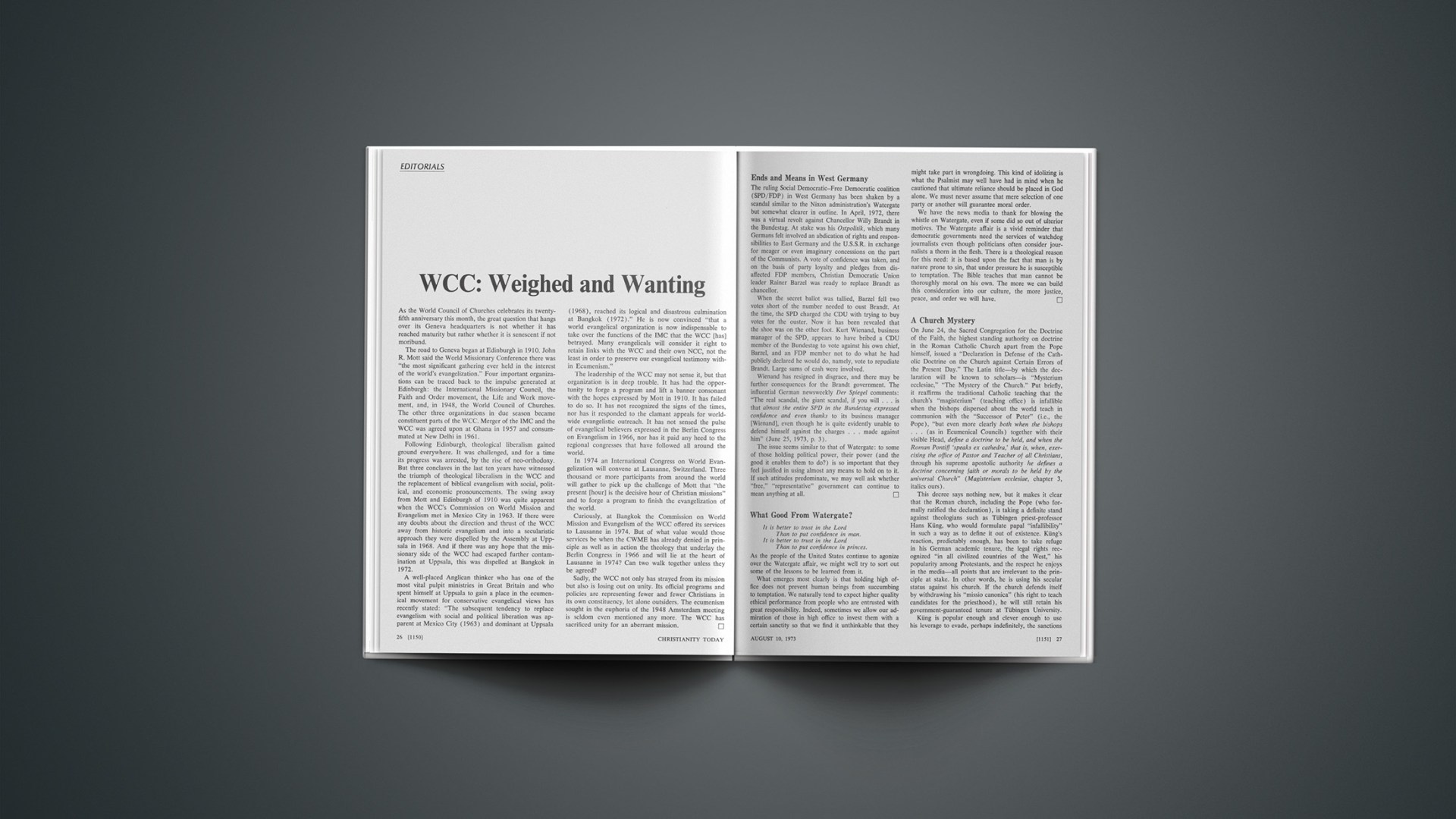As the World Council of Churches celebrates its twenty-fifth anniversary this month, the great question that hangs over its Geneva headquarters is not whether it has reached maturity but rather whether it is senescent if not moribund.
The road to Geneva began at Edinburgh in 1910. John R. Mott said the World Missionary Conference there was “the most significant gathering ever held in the interest of the world’s evangelization.” Four important organizations can be traced back to the impulse generated at Edinburgh: the International Missionary Council, the Faith and Order movement, the Life and Work movement, and, in 1948, the World Council of Churches. The other three organizations in due season became constituent parts of the WCC. Merger of the IMC and the WCC was agreed upon at Ghana in 1957 and consummated at New Delhi in 1961.
Following Edinburgh, theological liberalism gained ground everywhere. It was challenged, and for a time its progress was arrested, by the rise of neo-orthodoxy. But three conclaves in the last ten years have witnessed the triumph of theological liberalism in the WCC and the replacement of biblical evangelism with social, political, and economic pronouncements. The swing away from Mott and Edinburgh of 1910 was quite apparent when the WCC’s Commission on World Mission and Evangelism met in Mexico City in 1963. If there were any doubts about the direction and thrust of the WCC away from historic evangelism and into a secularistic approach they were dispelled by the Assembly at Uppsala in 1968. And if there was any hope that the missionary side of the WCC had escaped further contamination at Uppsala, this was dispelled at Bangkok in 1972.
A well-placed Anglican thinker who has one of the most vital pulpit ministries in Great Britain and who spent himself at Uppsala to gain a place in the ecumenical movement for conservative evangelical views has recently stated: “The subsequent tendency to replace evangelism with social and political liberation was apparent at Mexico City (1963) and dominant at Uppsala (1968), reached its logical and disastrous culmination at Bangkok (1972).” He is now convinced “that a world evangelical organization is now indispensable to take over the functions of the IMC that the WCC [has] betrayed. Many evangelicals will consider it right to retain links with the WCC and their own NCC, not the least in order to preserve our evangelical testimony within Ecumenism.”
The leadership of the WCC may not sense it, but that organization is in deep trouble. It has had the opportunity to forge a program and lift a banner consonant with the hopes expressed by Mott in 1910. It has failed to do so. It has not recognized the signs of the times, nor has it responded to the clamant appeals for worldwide evangelistic outreach. It has not sensed the pulse of evangelical believers expressed in the Berlin Congress on Evangelism in 1966, nor has it paid any heed to the regional congresses that have followed all around the world.
In 1974 an International Congress on World Evangelization will convene at Lausanne, Switzerland. Three thousand or more participants from around the world will gather to pick up the challenge of Mott that “the present [hour] is the decisive hour of Christian missions” and to forge a program to finish the evangelization of the world.
Curiously, at Bangkok the Commission on World Mission and Evangelism of the WCC offered its services to Lausanne in 1974. But of what value would those services be when the CWME has already denied in principle as well as in action the theology that underlay the Berlin Congress in 1966 and will lie at the heart of Lausanne in 1974? Can two walk together unless they be agreed?
Sadly, the WCC not only has strayed from its mission but also is losing out on unity. Its official programs and policies are representing fewer and fewer Christians in its own constituency, let alone outsiders. The ecumenism sought in the euphoria of the 1948 Amsterdam meeting is seldom even mentioned any more. The WCC has sacrificed unity for an aberrant mission.










